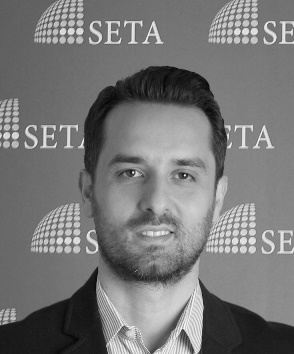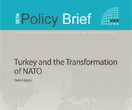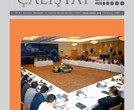The 20-year rivalry between Supreme Leader Ali Khamenei (above), who is the guardian of the Islamist regime, and Ali Akbar Hashemi Rafsanjani, the chairman of the Assembly of Experts, came to a head in the recent conflict in Iran.
The latest developments in Iran following the recent highly disputed presidential elections have created a wishful political atmosphere which has been characterized by hasty conclusions.
Not only ordinary people who follow the news from mainstream media, but also some intellectuals, researchers and even policymakers were presumptuous to conclude that the street protests in Iran were to bring a regime change for good, and that the protesters represent the “holy war” of liberal democracy vis-à-vis the theocracy of the mollas — or Islamism — in Iran.
Comparing the recent protests with the extensive street protests, strikes, resignations and demonstrations which were carried out successfully on the eve of the 1979 Islamic Revolution, the aforementioned people of pen and decision offered blind support to the protesters to make the belated regime change in Iran possible. However, this blind support, based upon wishful thinking, has yet again exposed the fact that a careful and comparative study of history and culture is a sine qua non to understand the current events and predict their outcomes.
We recently read many examples of this wishful thinking, lacking historicity, in the press. In one of those articles, starting with a tone that is mainstream in Washington policy-making circles and ending with a historically questionable proposition, the author, an expert on Turkey, refers to a paradigm shift in the Middle East. He argues that the recent protests in Iran are a “popular outburst against the Islamic regime” and that the message of the Iranian people through these protests is crystal clear: “Islamism belongs to the past and it is time to move on.” He goes on to say that “this is why demands by Supreme Leader Ali Khamenei, the guardian of the Islamist regime, to stop the demonstrations have gone unheeded.” In this sense, he asserts, the Iranian people are challenging Islamism — creating a paradigm shift — with their call for liberal democracy. With their call for liberal democracy, Iran would replace Turkey, which has a party in power rooted in Islamism, as the new popular, regional paradigm. Finally, he writes with a tone of ambiguity regarding the basis of his argument that “it is often said that Iran and Turkey are the two great rival political models of the Middle East. That is indeed the case, when one goes up, the other goes down.”
There are several assumptions within the confines of such a short article. First, Iranian protesters were actually anti-Islamist regime and pro-liberal democracy. These protests could have the potential to overthrow the Islamic regime. Liberal democracy was the political system that would follow the theocracy of the mollas in Iran. Turkey is a proponent of a dying regional paradigm, i.e., Islamism. Iran and Turkey are indeed two great rival political models of the Middle East. Last but not least, when either Iran or Turkey goes up, the other goes down.
Role of ulama
Any serious analysis on Iranian history and politics should start by mentioning the role of the ulama. Many studies have shown the ulama’s significance in creating a base for reform and change in Iran. We have seen the ulama taking a lead in many turning points in modern Iranian history, such as the constitutional revolution of 1905 and the Islamic Revolution of 1979. The prominent role given to the ulama by Twelver Shi’ism, their unique social (their ties with ordinary people, etc.), economic (religious taxes and foundations, etc.) and religious power (Velayat-e Faqih, etc.) have made them virtually inviolable in Iran. They not only control religious affairs, but also own and oversee economic enterprises through foundations. This inviolability has rendered futile any protests or upris


